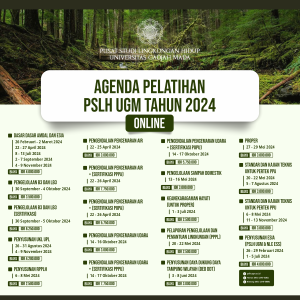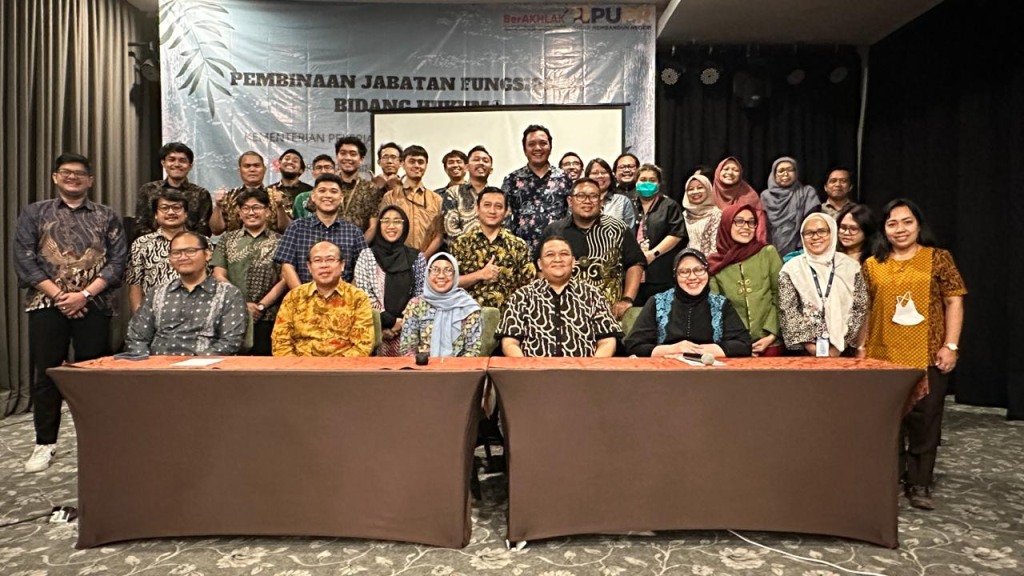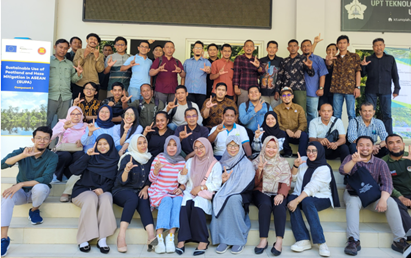The Environmental Studies Center (Pusat Studi Lingkungan Hidup, PSLH) at Universitas Gadjah Mada (UGM) offers a comprehensive suite of training programs aimed at enhancing environmental management competencies. These programs cater to professionals, students, and stakeholders involved in environmental assessment and management. The training program offered:
- Basic AMDAL and ESIA Training. This program provides foundational knowledge on Environmental Impact Assessment (AMDAL) and Environmental and Social Impact Assessment (ESIA). It covers the principles, benefits, and regulatory frameworks associated with environmental assessments. Participants gain insights into ecosystem typologies, impact identification, prediction, evaluation, and mitigation strategies. The curriculum also includes the preparation and feasibility assessment of AMDAL documents, an introduction to environmental document information systems, and ethical considerations for AMDAL practitioners.
- AMDAL Preparation Training. This training focuses on the systematic preparation of AMDAL documents. It encompasses planning, execution, and control phases of AMDAL preparation, including screening business activities, developing work plans, describing project activities and baseline environmental conditions, engaging public participation, identifying significant hypothetical impacts, defining study boundaries, selecting study methods, and compiling comprehensive AMDAL documents. Practical exercises and comprehensive examinations are integral components of this program.
- AMDAL Evaluation Training. Designed to assess AMDAL documents professionally, this program delves into the evaluation processes to ensure compliance with environmental standards and regulations. It aims to enhance the skills required for critical analysis and effective decision-making in environmental assessments.
- Hazardous and Toxic Materials (B3) and Waste Management Training. This course addresses the management of hazardous and toxic materials and their associated waste. It covers regulatory frameworks, best practices in handling, storage, disposal, and strategies for minimising environmental and health risks.
- UKL-UPL Preparation Training. Focusing on the preparation of Environmental Management Efforts (UKL) and Environmental Monitoring Efforts (UPL) documents, this training equips participants with the knowledge to develop effective environmental management plans for projects not requiring full AMDAL assessments.
- Strategic Environmental Assessment (KLHS) Training. This program offers insights into conducting Strategic Environmental Assessments for regional development plans, ensuring that environmental considerations are integrated into policy-making processes.
- Life Cycle Assessment (LCA) Training. Participants learn methodologies for assessing the environmental impacts of products or services throughout their life cycles. The course includes certification options to validate proficiency in LCA practices.
- Environmental Pollution Control Training. These courses cover pollution control strategies for air and water, including certification programs for responsible personnel overseeing pollution control installations.
- Biodiversity Management Training. This training focuses on strategies for conserving and managing biodiversity, emphasising the importance of maintaining ecological balance and protecting natural habitats.
- Domestic Waste Management Training. Participants are trained in effective management practices for domestic waste, aiming to reduce environmental pollution and promote sustainable waste-handling methods.

The University collaborates with the Ministry of Public Works and Housing (PUPR) regarding the legal domain. The main objective of this collaboration is to equip participants with good legal reasoning skills and an understanding of legal drafting theories, principles, and rules, including in the preparation of Ministerial Regulations, Ministerial Decrees, and Ministerial Circular Letters. Hopefully, participants will be able to minimise legal risks arising from these policies (Workshop for Legal Drafting).

The University also collaborated with GIZ in organising training on remote sensing and geographical information systems for peat assessment for the West Aceh Environment and Forestry Service and the Ministry of Environment and Forestry (KLHK). Training participants were forest rangers, technical staff from the West Aceh Environment and Forestry Service, FMUs located in the West Aceh area, and staff from the Ministry of Environment and Forestry, from the Directorate of Peat Damage Control (PKEG) and the Directorate of Air Pollution Control of DG PPKL.

